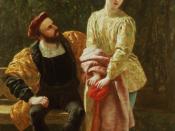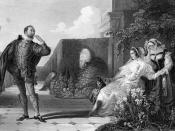Paradoxes within Shakespeare's ironic drama Twelfth Night
In Shakespeare's uniquely constructed comedy, Twelfth Night, there are several paradoxes within the characters. Misinterpretations as well as false presentation of reality are both common occurrences within the characters. Nearly the entire cast of characters use or fall victim to some form of deceit. Both Andrew and Viola present themselves as people they are not, and Orsino and Malvolio are fooled themselves about who they are and where they want and can be. Also, on a historical note, both Olivia and Feste the clown step (by default or self-attainment) out of the socially imposed stereotypes of their biologically born person. The reasons for Shakespeare's contradictions of characters are unknown; however, it can be hypothesized, knowing the man and his style that he was poking fun at elements of the society, in which he resided, as well as the ridiculousness of higher class citizens and the ritual absurdity of the lives they lived.
Deceptive portrayals, always an effective tactic when your actual self is insufficient for your goal. Andrew and Viola exercise this trickery in order to better their own statuses with people that they desire, and places they wish to be. Andrew, who is in reality a moron of a person and a wimp of knight, is described as though he is a rare genius and God's gift to Maria if she wishes him to be. Andrew's kinsman, Toby illustrates him to Maria by claiming that he, "plays the o' th' viol-de-gamboys, and speaks three or four languages word for word without a book, and hath all the good gifts of nature" (I.iii.25-28). Despite Toby's most convincing efforts, Maria is not fooled in the slightest. Andrew further contradicts Toby's description, confirming Marie's predetermined theories about him, when he mistakes her name to be...


